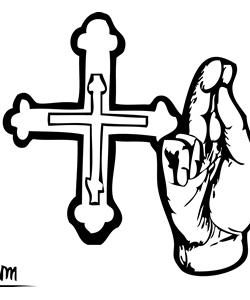|
|||
|---|---|---|---|
| This weekly bulletin insert complements the curriculum published by the Department of Christian Education of the Orthodox Church in America. This and many other Christian Education resources are available at http://dce.oca.org. | |||

We can look at several verses from Saint Paul's Letter to the Ephesians to see how the prayers of the Divine Liturgy are based on the Bible. In 4: 30 Paul entreats the Ephesians not to "grieve the Holy Spirit of God, in whom you were sealed for the day of redemption." In 3: 16 he has prayed that God "may grant you to be strengthened with might through His Spirit in the inner man." This Biblical idea of the Holy Spirit dwelling and working in us is reflected in the priest's prayer that "the communion of the Holy Spirit [may] be with all of you." The congregation asks the same for the priest by responding, "And with your spirit." Near the end of the Liturgy, we acknowledge this gift and sing, "We have seen the true Light! We have received the heavenly Spirit!" As we prepare to sing the Lord's Prayer, the priest prays that we may do so "with boldness." We ask God to allow us to do this very bold thing: to approach Him "as Father" and to address Him with the words of the prayer which Christ taught us. This plea has a basis in the Letter to the Ephesians. Near the end of the letter, Paul asks the Ephesians to make supplication for him, that "utterance may be given me in opening my mouth boldly, to proclaim the mystery of the Gospel" (6:19). In other verses, the source of our boldness is revealed. Paul writes that we have "boldness and confidence of access through our faith" in Jesus Christ (3:12). It is this faith that enables us to "dare"—a strong word—to call on God as "Our Father." The only way we can dare to do such a thing "without condemnation" is to ask Him to "make us worthy," and to "commend our whole life and hope" to Him. In the Prayer Before the Ambo, the priest asks God to "preserve the fulness of Your Church." This too has a basis in Ephesians. Paul writes that God intends His plan for our salvation to happen through the Church: "...that through the church the manifold wisdom of God might now be made known..." (3: 13). But it is not only that the Church has a vital role in God's saving work. Ephesians also includes, in the fifth chapter, the well-known comparison of marriage to the relationship between Christ and the Church. The Church is precious to God; He loves it as a bridegroom loves his bride. So the Prayer Before the Ambo asks God to "sanctify those who love the beauty of Your house." These words ask a blessing on those who share God's love for His Church by honoring and respecting her. Paul ends his letter to the Ephesians with a similar blessing: "Grace be with all who love our Lord Jesus Christ with a love undying." |
|||
